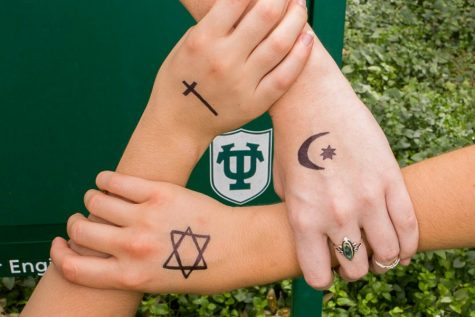How Tulane students stay engaged with religion in college

Many students have fond memories of waking up early on Christmas or finally finding the Afikomen during Passover. The majority of students are brought up with a religious background, but fewer choose to continue practicing in college.
More students than ever are non-religious. According to data from the Cooperative Institutional Research Program’s annual freshman survey, administered in 2016 to over 137,000 first-year students at 138 colleges and universities, including Tulane University, 31 percent of students nationwide claim no religious affiliation.
According to Muslim Student Association President Zainab Sherwani, the transition to college can be jarring for students heavily involved in their religious communities at home.
“In Houston I had a lot of Muslim friends. It was a very diverse community, a lot of mosques around, and then I came here, and it was kind of a culture shock, ‘cause I didn’t meet many Muslims at first,” Sherwani said.
It is easy for students to feel a little alienated while adapting to a new environment, according to Sherwani, and they can struggle to find their place on campus. Sherwani said attending the first MSA meeting her freshman year made her feel more comfortable on campus.
Joining a religious community at Tulane helps some students feel comfortable and make friends. Others may join an organization to stay connected with their religion.
Junior Shees Ahmed said coming to Tulane gave him the opportunity to meet people with similar values as him.
“In college it’s easier to form friend groups out of your own choosing — so people who respect my religion and my values,” Ahmed said.
Having already had a deep religious foundation, Ahmed joined MSA to meet people with backgrounds akin to his own. On-campus communities can also be catalysts for enhancing spirituality, according to one Jewish student.
“I’ve actually become more religious since coming to Tulane,” senior Rachel Berwald said. “I think this is in part because I feel incredibly comfortable being Jewish on campus.”
Getting involved with Hillel gave Berwald “the resources and support to explore [her] own Jewish identity” in a way she could not at home.
Sophomore Morgan Guerra knew before she even started school she wanted to be involved with the Catholic Center on campus so she could go to Mass. After a few weeks, she also found a new community.
“I realized that the people there … we all find joy in the same things,” Guerra said. “It’s almost like second nature to strengthen my own spirituality because we’re all strengthening each other.”
Joining a religious organization can bring something familiar and comforting to an often tumultuous part of life. It can even become a home away from home.
“My religious community at Tulane is, at its core, a support network,” Berwald said.
Not all students who were raised to be religious continue to practice their religion in college. Sophomore Andy Sykes said he was raised Methodist but chooses not to participate in religious organizations on campus.
“Similarly to other campus groups, I’m often intimidated to go to campus religious groups,” Sykes said. “Probably because I really hated youth church, the idea of being in something similar is not really appealing … I much prefer to come to my own conclusions on religion than to listen to those of others.”
Your donation will support the student journalists of Tulane University. Your contribution will allow us to purchase equipment and cover our annual website hosting costs.


